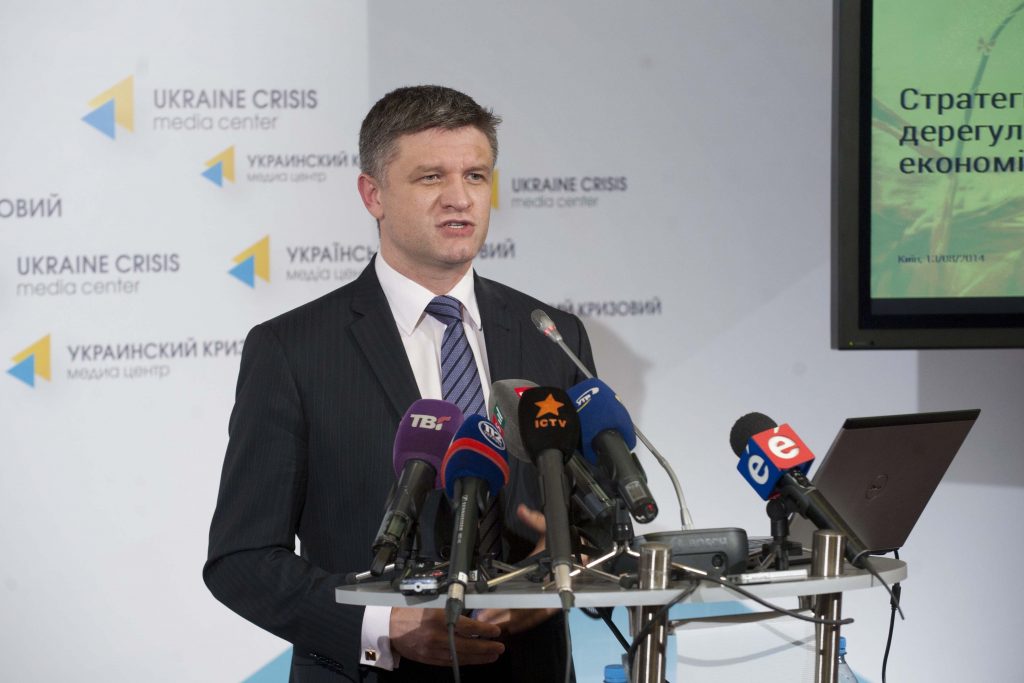Kyiv, 13 August 2014 – “Reforms tactics based on three components – simplicity, transparency and appeal announced by the President of Ukraine is actually about deregulation,” declared Dmytro Shymkiv, Deputy Head of the Presidential Administration of Ukraine at a briefing in the Ukraine Crisis Media Center. “Economy is the force that moves a country forward, it is currently not in its best shape. That’s why we need to ensure the simplicity of doing business in Ukraine. Business needs to be transparent and authorities when interacting with business have to be transparent as well. Ukraine has to be attractive for investment, because that’s what the investor is looking for as a first thing,” he explained.
“The reform aims to substantially simplify conducting of business, to decrease businessmen’s expenses and to considerably improve Ukraine’s positions in the Doing Business rating,” added Pavlo Sheremeta, Minister for Economic Development and Trade of Ukraine.
When developing the strategy for deregulation the experts group under the Ministry of Economic Development and Trade of Ukraine headed by Danylo Pasko held an opinion poll among around 100 organization, analyzed and structured around 1000 regulatory restrictions.
According to Mr. Pasko: “We expect that the overall economic effect from implementation of the strategy will amount to around UAH 170 billion until 2020. Introduction of only 14 priority initiatives will allow eliminating corruption flows worth of UAH 8-9 billion a year.”
1000 deregulation initiatives concept foresees abolition of licenses, permissions, orders and certificates, shortening of frequency of checks, and even elimination of entire units and state regulatory bodies (it is particularly planned to decrease the number of agencies in possession of control functions from 79 to 32).
In addition to that a group of advisors to Minister Sheremeta held detailed analysis of the economic effect the implementation of the strategy will bring to the key areas of Ukraine’s economy: food industry, agriculture, construction, energy, oil and gas, information technologies. The economic effect expected across the sectors constitutes around UAH 85 billion, corruption flows will be decreased by UAH 60 billion and budget expenses by UAH 16 billion, in particular:
– deregulation in the food industry aimed to bring production processes in line with the EU norms and standards (deregulation economic effect will amount to around UAH 30 billion, corruption component will decrease by around UAH 7 billion).
– the main deregulation direction in agricultural sector is to combat corruption and enhance export (economic effect – UAH 10 billion, corruption component – UAH 7 billion);
– deregulation in construction aims to increase Ukraine’s positions in the Doing Business rating and to eliminate corruption (economic effect – UAH 16 billion, corruption component – UAH 21 billion);
– similarly deregulation initiatives in the energy sector aim to eliminate corruption and increase Ukraine’s positions in the Doing Business rating (economic effect – around UAH 11 billion, corruption component – UAH 12 billion);
– in the oil and gas sector the key is to increase the share of own oil and gas extraction and decrease the dependence on the supply from the Russian Federation (expected economic effect – around UAH 11 billion, same amount from corruption component decrease);
– deregulation in the IT sector aims to integrate Ukrainian IT-sector into the international market (economic effect – around UAH 6 billion, corruption component – UAH 3 billion).
Danylo Pasko informed that in order to engage the general public into discussion of the deregulation initiatives developed by the experts Easy Business Internet platform was set up www.easybusiness.in.ua). The information place on this web source will not only allow to familiarize oneself with the suggested initiatives but to track the course of their implementation in Ukraine’s state bodies as well as to get the feedback on their implementation. The web site also allows suggesting own initiative directly to the experts of the Ministry for Economic Development and Trade of Ukraine.
At the same time as Mr. Sheremeta noted: “There’s the most difficult part ahead – implementation of the deregulation initiatives.” “If the Parliament votes through the deregulation draft laws in the nearest time the first stage of the changes implemented could be finalized in less than a year,” commented on Danylo Pasko.
Dmytro Shymkiv also noted that “there is political will of the President of Ukraine to introduce those changes. To enable that coordinated action among all branches of power in Ukraine is required, first of all that of the Parliament (Verkhovna Rada) as majority of the deregulation initiatives have to be adopted as laws.”



